Papers by Felix A. Cristiá
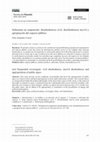
Revista de Filosofía. Universidad Complutense de Madrid, 2024
Resumen. El presente ensayo se centra en las condiciones de posibilidad que propician la apropiac... more Resumen. El presente ensayo se centra en las condiciones de posibilidad que propician la apropiación del espacio público como una forma de participación política activa en las ciudades bajo sistemas democráticos. La postura de investigación se circunscribe dentro de la filosofía política de la vertiente disociativa de lo social, por lo que se analiza la noción de lo público con relación al espacio a partir de la confrontación acontecida cuando los miembros que comparten los usos del espacio en las ciudades desacuerdan, desobedecen o se oponen al poder que rige sobre estos. De esta manera, el espacio público, y su capacidad de ser apropiado, es constituyente de las posibilidades de cambio y participación política.
/
[en] Suspended sovereignty: civil disobedience, uncivil disobedience and appropriation of public spaceAbstract
Abstract. This essay focuses on the conditions of possibility that favor the appropriation of public space as a form of active political participation in cities under democratic systems. The research stance is circumscribed within the political philosophy of the dissociative aspect of the social, so the notion of the public in relation to space is analyzed from the confrontation that occurs when the members who share the uses of space in cities disagree, disobey or oppose the power that governs over it. In this way, the public space, and its ability to be appropriated, is constitutive of the possibilities of change and political participation.

Eidos. Revista de Filosofía, 2024
Resumen: La presente investigación aborda la validez del espacio público como auspiciador de la p... more Resumen: La presente investigación aborda la validez del espacio público como auspiciador de la participación política, centrándose en las diversas formas de apropiación del espacio que pueden fomentar dicha participación. El objetivo principal consiste en demostrar las posibilidades de acción política de las y los ciudadanos al expresar su desacuerdo a través de distintos procesos de apropiación del espacio público: la apropiación por dominación, por rebelión, la apropiación vandálica y artística. Se sostiene que la legitimidad de un sistema de gobierno puede cuestionarse o debilitarse según la actuación pública del cuerpo ciudadano contra el Estado o la entidad que ejerce la soberanía sobre el espacio. El análisis se llevará a cabo desde la filosofía política de la vertiente disociativa y el realismo político a través de los conceptos de conflicto, soberanía y desacuerdo.
/
EN: Revealing political space. Types of appropriation of public space as active politics
Abstract: The present research addresses the validity of public space as a promoter of the political participation, focusing on the various forms of appropriation of space that can foster said participation. The main objective is to demonstrate the possibilities of political action of citizens by expressing their disagreement through different processes of appropriation of public space: appropriation by domination, appropriation by rebellion, vandalic and artistic appropriation. It will be argued that the legitimacy of a government system can be questioned or weakened depending on the public actions of the citizen body against the State or the entity that exercises sovereignty over space. The analysis will be carried out from the political philosophy of the dissociative aspect and political realism, through the concepts of conflict, sovereignty, and disagreement.
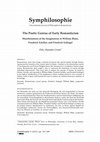
Symphilosophie. International Journal of Philosophical Romanticism, 2023
Abstract: Romanticism, more than being a cultural movement that spread mainly through Europe, rep... more Abstract: Romanticism, more than being a cultural movement that spread mainly through Europe, represented the freedom of the creative spirit or Genius. Contrary to the deterministic nature of Neoclassicism and French Enlightenment that threatened to overshadow human imagination, Romanticism ideal sought a way to transcend the limitations of reason through individual improvement. This essay aims to analyze the concept of Genius (as found in Herder, Novalis, and especially in William Blake, Friedrich Schiller, and Friedrich Schlegel) as the highest manifestation of the imagination, which, tending toward its own concepts of infinity, seeks to place itself beyond the need of achieve an aesthetic-historical synthesis of knowledge.
/
Zusammenfassung: Die Romantik war nicht nur eine kulturelle Bewegung, die sich hauptsächlich in Europa ausbreitete, sondern repräsentierte die Freiheit des kreativen Geistes oder Genies. Im Gegensatz zur deterministischen Natur des Neoklassizismus und der französischen Aufklärung, die die menschliche Vorstellungskraft zu überschatten drohten, suchte das Ideal der Romantik nach einem Weg, die Grenzen der Vernunft durch individuelle Verbesserung zu überwinden. Dieser Essay zielt darauf ab, den Begriff des poetischen Genies (wie er bei Herder, Novalis und insbesondere bei William Blake, Friedrich Schiller und Friedrich Schlegel zu finden ist) als höchste kreative Manifestation zu analysieren, die sich, zu ihrem eigenen Begriff der Unendlichkeit tendierend, jenseits der Notwendigkeit, eine historisch-künstlerische Synthese des Wissens zu erreichen.
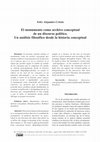
Revista de Filosofía de la Universidad de Costa Rica, 2024
Resumen: El presente artículo analiza el monumento como un archivo conceptual que intenta estable... more Resumen: El presente artículo analiza el monumento como un archivo conceptual que intenta establecer la permanencia de un discurso en el espacio, que a su vez se convierte en el objeto que permite seguir el cambio de sentido de los conceptos que lo componen. El estudio se aborda principalmente desde la historia conceptual (Begriffsgeschichte), en cuanto se enfoca en los usos de los conceptos en un momento determinado y en sus cambios de sentido a través de la historia, para conocer el alcance social –y legitimidad– que posee el monumento como contenedor del recuerdo colectivo. La memoria que el monumento pretende hacer perdurar puede fundamentar la eventual actualización o deslegitimación de los discursos que conceptualmente lo han erigido y, por lo tanto, el monumento mismo puede albergar su propia revocación.
/
EN: The monument as a conceptual archive of a political discourse. A philosophical analysis from conceptual history
Abstract: This article of reflection analyzes the monument as a conceptual archive that tries to establish the permanence of a political discourse on space, which in turn becomes the object that allows us to follow the change of meaning of the concepts that compose it. The study is approached mainly from conceptual history (Begriffsgeschichte), insofar as it focuses on the uses of concepts both at a given moment and according to their changes of meaning throughout history. This can be useful to know the monument’s social scope –and legitimacy– as the container of collective memory. The memory that the monument tries to make last can support the eventual update or delegitimization of the discourses that have conceptually erected it. Therefore, the monument itself can host its own revocation.
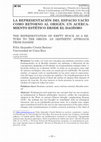
RAPHISA. Revista de Antropología y Filosofía de lo Sagrado, 2022
Resumen: La nada y el vacío son conceptos que podemos reconocer como fundamentales en la filosofí... more Resumen: La nada y el vacío son conceptos que podemos reconocer como fundamentales en la filosofía oriental, sin embargo, a diferencia de las concepciones adoptadas en Occidente, en el pensamiento antiguo chino –y haciendo énfasis en el daoísmo (道教)– la nada no se presenta como algo de carácter ontológico, sino como un estado previo indefinible. De manera similar, el espacio vacío se manifestaba en las artes como la representación del lugar en el que ocurrían los cambios y las transformaciones de la realidad, apuntando hacia el ideal del artista en dejarse fluir durante el proceso de creación. De esta manera se hacía presente la ausencia, acercándose al origen de todas las cosas.
/
EN: The representation of empty space as a return to the origin. An aesthetic approach from Daoism/Taoism
Abstract: Nothingness and emptiness are concepts that we can recognize as fundamental in Eastern philosophy, however, unlike the conceptions adopted in the West, in ancient Chinese thought –emphasizing Daoism (道教)– the nothing was not thought as ‘something’ with an ontological character, but as an indefinable previous state. In a similar way, empty space manifested itself in the arts as the representation of the place where changes and transformations of reality occurred, pointing to the ideal of the artist in allowing oneself to flow during the creative process. In this way the absence was made present, approaching the origin of all things.

Revista Filosofía UIS, 2022
Resumen: el presente texto aborda el problema de la apropiación cultural desde la injusticia epis... more Resumen: el presente texto aborda el problema de la apropiación cultural desde la injusticia epistémica y la ignorancia activa, es decir, teniendo como base el perjuicio a los sujetos como fuentes de conocimiento. La apropiación cultural debería ser entendida como una forma de injusticia epistémica que: a) involucra necesariamente una reducción de credibilidad de los sujetos como fuentes de información según estereotipos establecidos por los grupos hegemónicos; b) la apropiación epistémica de su producción cultural; y c) la gestión de la ignorancia por parte de los grupos dominadores para fortalecer sus posiciones.
/
EN: Cultural Appropriation as Epistemic Injustice. About the Problem of Talking for Others
Abstract: this essay addresses the problem of cultural appropriation from epistemic injustice and active ignorance, that is, based on the harm to subjects as sources of knowledge. It will be proposed that cultural appropriation should be understood as a form of epistemic injustice that: a) necessarily involves a reduction in the credibility of subjects as sources of information according to stereotypes established by hegemonic groups; b) the epistemic appropriation of their cultural production; and c) the management of ignorance by the dominant groups to strengthen their positions.
Revista de Filosofía de la Universidad de Costa Rica, 2021
Resumen: El presente ensayo tiene por objetivo analizar el concepto de Genio Poético romántico (H... more Resumen: El presente ensayo tiene por objetivo analizar el concepto de Genio Poético romántico (Herder, Blake, Schlegel, Novalis) como la máxima manifestación creativa que no aspira a la síntesis del conocimiento histórico, sino a situarse más allá de la necesidad de lograr síntesis alguna, tendiendo hacia un concepto diferente de lo infinito con respecto al idealismo absoluto.
/
EN: The Poetic Genius of early Romanticism: The creative manifestation as a drive toward infinity
Abstract: This essay aims to analyze the concept of Romantic Poetic Genius (Herder, Blake, Schlegel, Novalis) as the maximum creative manifestation that does not aspire to a historical synthesis, but to place itself beyond the need to achieve any synthesis, tending towards a different concept of infinity with respect to absolute idealism.
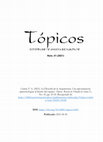
Tópicos. Revista de Filosofía de Santa Fe, 2021
Resumen: El proceso de diseño arquitectónico parte de una actividad mental basada en relaciones d... more Resumen: El proceso de diseño arquitectónico parte de una actividad mental basada en relaciones de conceptos abstractos y empíricos previos a la materialización de lo que conocemos como espacio construido y arquitectura. Este proceso no empieza en bocetos o planos, sino de manera previa en la mente mediante procesos de relaciones imaginarias (síntesis) de conceptos y analogías. La relación entre la filosofía y la arquitectura hoy no se muestra tan estrecha como en tiempos remotos, sin embargo, su comprensión cobra gran importancia para cuestionar y experimentar de la mejor manera posible los espacios en los que el ser humano crece, se desarrolla y produce su visión de mundo.
/
EN: The Philosophy of Architecture. An epistemological approach to the design of space
Abstract: The process of architectural design starts from a mental activity based on relations of abstract and empirical concepts prior to the materialization of what we know as built space and architecture. This process does not start in sketches or plans, but in the mind in advance through processes of imaginary relationships (synthesis) of concepts and analogies. The relationship between philosophy and architecture nowadays maybe is not as close as in ancient times, however, the understanding of this relationship becomes crucial in order to experience in the best possible way the spaces in which the human being grows, develops itself and produces his/her vision of world.
Essays by Felix A. Cristiá
Los Hijos del Fuego. Cuentos basados en leyendas urbanas y tradicionales de Latinoamérica, 2024
Prólogo del libro "Los Hijos del Fuego. Cuentos basados en leyendas urbanas y tradicionales de La... more Prólogo del libro "Los Hijos del Fuego. Cuentos basados en leyendas urbanas y tradicionales de Latinoamérica". Coordinado por Revista Virtual Quimera y publicado por Editorial UCR, Costa Rica.
Revista Virtual Quimera, 2022
Johann von Goethe es mayormente recordado por su imperecedera obra literaria, pero también se ded... more Johann von Goethe es mayormente recordado por su imperecedera obra literaria, pero también se dedicó a un área menos conocida: las ciencias naturales. Haeckel, apasionado por la ciencia natural, pero también de la poesía y la filosofía, compartía el pensamiento de Goethe de que escribir ayuda a comprender el desarrollo de la naturaleza.
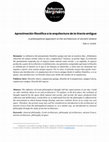
Reflexiones Marginales, 2020
Resumen: La influencia del pensamiento filosófico griego aún late en nuestros días. ¿Podríamos re... more Resumen: La influencia del pensamiento filosófico griego aún late en nuestros días. ¿Podríamos referir-nos de manera similar sobre su arte y arquitectura? Analizar, en primer lugar, la evolución del pensamiento inspirado por el espacio (tanto natural como social), y en segundo, el espacio pro-ducido a partir de la reflexión y la deliberación, nos permitiría comprender qué tanto la filoso-fía es influida por el entorno en el que el ser humano se desarrolla, y cómo una vez alcanzado nos impulsa a querer crear nuestro propio espacio. Por lo tanto, el presente ensayo bien puede considerarse una introducción a la arquitectura de la Grecia antigua desde el análisis filosófico, o si se quiere, una introducción a la filosofía clásica por medio del estudio de la arquitectura.
/
EN: A philosophical approach to the architecture of ancient Greece
Abstract: The influence of Greek philosophical thought still has repercussions in our day. Could we refer similarly about its art and architecture? To analyze, in the first place, the evolution of thought inspired by the space (both natural and social), and second, the space produced from reflection and deliberation, would allow us to understand how far the philosophy is influenced by the en-vironment in which human beings develop, and once reached, drives us to create our own space. Therefore, the present essay may well be considered an introduction to the architecture of ancient Greece from the philosophical analysis or, in a similar way, an introduction to clas-sical philosophy through the study of ancient architecture.
Books by Felix A. Cristiá

Anábasis, Antología de Narrativa Fantástica y Ficción Histórica, 2020
Las letras escritas en este libro van y vienen entre el presente
y el sueño, la historia y la mem... more Las letras escritas en este libro van y vienen entre el presente
y el sueño, la historia y la memoria condensada en el mito y la
leyenda, amalgama que compone el hilo conductor de este viaje
cronológico —anábasis a través de la ficción y de las distintas etapas históricas— el cual nos conduce a ese mar de significados, de
verdades cifradas y estructuras maravillosas que es el tiempo mítico;
no sin antes haberle permitido al lector ser partícipe de la interacción entre dioses, arquetipos, personajes de la literatura universal,
6
apariciones y figuras históricas que dan pie para tratar —mediante
recursos como la desmitificación, la alegorización, la transmitificación o la crítica directa— temas como el amor diverso, la inclusión,
la lucha contra la opresión patriarcal, la revaloración de lo monstruoso como un elemento de crítica social, el mito de la inmortalidad etc. Esta colección de narrativa refleja las vivencias del hombre
contemporáneo que se proyecta a otros espacios, y materializa
una realidad de la que no siempre se tiene conciencia: el hecho de
que los mitos, ya sean alegóricos, épicos o legendarios, continúan
comunicándose con nosotros e interactuando entre ellos, expandiéndose y mostrando su fecundidad en la cultura.

Uploads
Papers by Felix A. Cristiá
/
[en] Suspended sovereignty: civil disobedience, uncivil disobedience and appropriation of public spaceAbstract
Abstract. This essay focuses on the conditions of possibility that favor the appropriation of public space as a form of active political participation in cities under democratic systems. The research stance is circumscribed within the political philosophy of the dissociative aspect of the social, so the notion of the public in relation to space is analyzed from the confrontation that occurs when the members who share the uses of space in cities disagree, disobey or oppose the power that governs over it. In this way, the public space, and its ability to be appropriated, is constitutive of the possibilities of change and political participation.
/
EN: Revealing political space. Types of appropriation of public space as active politics
Abstract: The present research addresses the validity of public space as a promoter of the political participation, focusing on the various forms of appropriation of space that can foster said participation. The main objective is to demonstrate the possibilities of political action of citizens by expressing their disagreement through different processes of appropriation of public space: appropriation by domination, appropriation by rebellion, vandalic and artistic appropriation. It will be argued that the legitimacy of a government system can be questioned or weakened depending on the public actions of the citizen body against the State or the entity that exercises sovereignty over space. The analysis will be carried out from the political philosophy of the dissociative aspect and political realism, through the concepts of conflict, sovereignty, and disagreement.
/
Zusammenfassung: Die Romantik war nicht nur eine kulturelle Bewegung, die sich hauptsächlich in Europa ausbreitete, sondern repräsentierte die Freiheit des kreativen Geistes oder Genies. Im Gegensatz zur deterministischen Natur des Neoklassizismus und der französischen Aufklärung, die die menschliche Vorstellungskraft zu überschatten drohten, suchte das Ideal der Romantik nach einem Weg, die Grenzen der Vernunft durch individuelle Verbesserung zu überwinden. Dieser Essay zielt darauf ab, den Begriff des poetischen Genies (wie er bei Herder, Novalis und insbesondere bei William Blake, Friedrich Schiller und Friedrich Schlegel zu finden ist) als höchste kreative Manifestation zu analysieren, die sich, zu ihrem eigenen Begriff der Unendlichkeit tendierend, jenseits der Notwendigkeit, eine historisch-künstlerische Synthese des Wissens zu erreichen.
/
EN: The monument as a conceptual archive of a political discourse. A philosophical analysis from conceptual history
Abstract: This article of reflection analyzes the monument as a conceptual archive that tries to establish the permanence of a political discourse on space, which in turn becomes the object that allows us to follow the change of meaning of the concepts that compose it. The study is approached mainly from conceptual history (Begriffsgeschichte), insofar as it focuses on the uses of concepts both at a given moment and according to their changes of meaning throughout history. This can be useful to know the monument’s social scope –and legitimacy– as the container of collective memory. The memory that the monument tries to make last can support the eventual update or delegitimization of the discourses that have conceptually erected it. Therefore, the monument itself can host its own revocation.
/
EN: The representation of empty space as a return to the origin. An aesthetic approach from Daoism/Taoism
Abstract: Nothingness and emptiness are concepts that we can recognize as fundamental in Eastern philosophy, however, unlike the conceptions adopted in the West, in ancient Chinese thought –emphasizing Daoism (道教)– the nothing was not thought as ‘something’ with an ontological character, but as an indefinable previous state. In a similar way, empty space manifested itself in the arts as the representation of the place where changes and transformations of reality occurred, pointing to the ideal of the artist in allowing oneself to flow during the creative process. In this way the absence was made present, approaching the origin of all things.
/
EN: Cultural Appropriation as Epistemic Injustice. About the Problem of Talking for Others
Abstract: this essay addresses the problem of cultural appropriation from epistemic injustice and active ignorance, that is, based on the harm to subjects as sources of knowledge. It will be proposed that cultural appropriation should be understood as a form of epistemic injustice that: a) necessarily involves a reduction in the credibility of subjects as sources of information according to stereotypes established by hegemonic groups; b) the epistemic appropriation of their cultural production; and c) the management of ignorance by the dominant groups to strengthen their positions.
/
EN: The Poetic Genius of early Romanticism: The creative manifestation as a drive toward infinity
Abstract: This essay aims to analyze the concept of Romantic Poetic Genius (Herder, Blake, Schlegel, Novalis) as the maximum creative manifestation that does not aspire to a historical synthesis, but to place itself beyond the need to achieve any synthesis, tending towards a different concept of infinity with respect to absolute idealism.
/
EN: The Philosophy of Architecture. An epistemological approach to the design of space
Abstract: The process of architectural design starts from a mental activity based on relations of abstract and empirical concepts prior to the materialization of what we know as built space and architecture. This process does not start in sketches or plans, but in the mind in advance through processes of imaginary relationships (synthesis) of concepts and analogies. The relationship between philosophy and architecture nowadays maybe is not as close as in ancient times, however, the understanding of this relationship becomes crucial in order to experience in the best possible way the spaces in which the human being grows, develops itself and produces his/her vision of world.
Essays by Felix A. Cristiá
/
EN: A philosophical approach to the architecture of ancient Greece
Abstract: The influence of Greek philosophical thought still has repercussions in our day. Could we refer similarly about its art and architecture? To analyze, in the first place, the evolution of thought inspired by the space (both natural and social), and second, the space produced from reflection and deliberation, would allow us to understand how far the philosophy is influenced by the en-vironment in which human beings develop, and once reached, drives us to create our own space. Therefore, the present essay may well be considered an introduction to the architecture of ancient Greece from the philosophical analysis or, in a similar way, an introduction to clas-sical philosophy through the study of ancient architecture.
Books by Felix A. Cristiá
y el sueño, la historia y la memoria condensada en el mito y la
leyenda, amalgama que compone el hilo conductor de este viaje
cronológico —anábasis a través de la ficción y de las distintas etapas históricas— el cual nos conduce a ese mar de significados, de
verdades cifradas y estructuras maravillosas que es el tiempo mítico;
no sin antes haberle permitido al lector ser partícipe de la interacción entre dioses, arquetipos, personajes de la literatura universal,
6
apariciones y figuras históricas que dan pie para tratar —mediante
recursos como la desmitificación, la alegorización, la transmitificación o la crítica directa— temas como el amor diverso, la inclusión,
la lucha contra la opresión patriarcal, la revaloración de lo monstruoso como un elemento de crítica social, el mito de la inmortalidad etc. Esta colección de narrativa refleja las vivencias del hombre
contemporáneo que se proyecta a otros espacios, y materializa
una realidad de la que no siempre se tiene conciencia: el hecho de
que los mitos, ya sean alegóricos, épicos o legendarios, continúan
comunicándose con nosotros e interactuando entre ellos, expandiéndose y mostrando su fecundidad en la cultura.
/
[en] Suspended sovereignty: civil disobedience, uncivil disobedience and appropriation of public spaceAbstract
Abstract. This essay focuses on the conditions of possibility that favor the appropriation of public space as a form of active political participation in cities under democratic systems. The research stance is circumscribed within the political philosophy of the dissociative aspect of the social, so the notion of the public in relation to space is analyzed from the confrontation that occurs when the members who share the uses of space in cities disagree, disobey or oppose the power that governs over it. In this way, the public space, and its ability to be appropriated, is constitutive of the possibilities of change and political participation.
/
EN: Revealing political space. Types of appropriation of public space as active politics
Abstract: The present research addresses the validity of public space as a promoter of the political participation, focusing on the various forms of appropriation of space that can foster said participation. The main objective is to demonstrate the possibilities of political action of citizens by expressing their disagreement through different processes of appropriation of public space: appropriation by domination, appropriation by rebellion, vandalic and artistic appropriation. It will be argued that the legitimacy of a government system can be questioned or weakened depending on the public actions of the citizen body against the State or the entity that exercises sovereignty over space. The analysis will be carried out from the political philosophy of the dissociative aspect and political realism, through the concepts of conflict, sovereignty, and disagreement.
/
Zusammenfassung: Die Romantik war nicht nur eine kulturelle Bewegung, die sich hauptsächlich in Europa ausbreitete, sondern repräsentierte die Freiheit des kreativen Geistes oder Genies. Im Gegensatz zur deterministischen Natur des Neoklassizismus und der französischen Aufklärung, die die menschliche Vorstellungskraft zu überschatten drohten, suchte das Ideal der Romantik nach einem Weg, die Grenzen der Vernunft durch individuelle Verbesserung zu überwinden. Dieser Essay zielt darauf ab, den Begriff des poetischen Genies (wie er bei Herder, Novalis und insbesondere bei William Blake, Friedrich Schiller und Friedrich Schlegel zu finden ist) als höchste kreative Manifestation zu analysieren, die sich, zu ihrem eigenen Begriff der Unendlichkeit tendierend, jenseits der Notwendigkeit, eine historisch-künstlerische Synthese des Wissens zu erreichen.
/
EN: The monument as a conceptual archive of a political discourse. A philosophical analysis from conceptual history
Abstract: This article of reflection analyzes the monument as a conceptual archive that tries to establish the permanence of a political discourse on space, which in turn becomes the object that allows us to follow the change of meaning of the concepts that compose it. The study is approached mainly from conceptual history (Begriffsgeschichte), insofar as it focuses on the uses of concepts both at a given moment and according to their changes of meaning throughout history. This can be useful to know the monument’s social scope –and legitimacy– as the container of collective memory. The memory that the monument tries to make last can support the eventual update or delegitimization of the discourses that have conceptually erected it. Therefore, the monument itself can host its own revocation.
/
EN: The representation of empty space as a return to the origin. An aesthetic approach from Daoism/Taoism
Abstract: Nothingness and emptiness are concepts that we can recognize as fundamental in Eastern philosophy, however, unlike the conceptions adopted in the West, in ancient Chinese thought –emphasizing Daoism (道教)– the nothing was not thought as ‘something’ with an ontological character, but as an indefinable previous state. In a similar way, empty space manifested itself in the arts as the representation of the place where changes and transformations of reality occurred, pointing to the ideal of the artist in allowing oneself to flow during the creative process. In this way the absence was made present, approaching the origin of all things.
/
EN: Cultural Appropriation as Epistemic Injustice. About the Problem of Talking for Others
Abstract: this essay addresses the problem of cultural appropriation from epistemic injustice and active ignorance, that is, based on the harm to subjects as sources of knowledge. It will be proposed that cultural appropriation should be understood as a form of epistemic injustice that: a) necessarily involves a reduction in the credibility of subjects as sources of information according to stereotypes established by hegemonic groups; b) the epistemic appropriation of their cultural production; and c) the management of ignorance by the dominant groups to strengthen their positions.
/
EN: The Poetic Genius of early Romanticism: The creative manifestation as a drive toward infinity
Abstract: This essay aims to analyze the concept of Romantic Poetic Genius (Herder, Blake, Schlegel, Novalis) as the maximum creative manifestation that does not aspire to a historical synthesis, but to place itself beyond the need to achieve any synthesis, tending towards a different concept of infinity with respect to absolute idealism.
/
EN: The Philosophy of Architecture. An epistemological approach to the design of space
Abstract: The process of architectural design starts from a mental activity based on relations of abstract and empirical concepts prior to the materialization of what we know as built space and architecture. This process does not start in sketches or plans, but in the mind in advance through processes of imaginary relationships (synthesis) of concepts and analogies. The relationship between philosophy and architecture nowadays maybe is not as close as in ancient times, however, the understanding of this relationship becomes crucial in order to experience in the best possible way the spaces in which the human being grows, develops itself and produces his/her vision of world.
/
EN: A philosophical approach to the architecture of ancient Greece
Abstract: The influence of Greek philosophical thought still has repercussions in our day. Could we refer similarly about its art and architecture? To analyze, in the first place, the evolution of thought inspired by the space (both natural and social), and second, the space produced from reflection and deliberation, would allow us to understand how far the philosophy is influenced by the en-vironment in which human beings develop, and once reached, drives us to create our own space. Therefore, the present essay may well be considered an introduction to the architecture of ancient Greece from the philosophical analysis or, in a similar way, an introduction to clas-sical philosophy through the study of ancient architecture.
y el sueño, la historia y la memoria condensada en el mito y la
leyenda, amalgama que compone el hilo conductor de este viaje
cronológico —anábasis a través de la ficción y de las distintas etapas históricas— el cual nos conduce a ese mar de significados, de
verdades cifradas y estructuras maravillosas que es el tiempo mítico;
no sin antes haberle permitido al lector ser partícipe de la interacción entre dioses, arquetipos, personajes de la literatura universal,
6
apariciones y figuras históricas que dan pie para tratar —mediante
recursos como la desmitificación, la alegorización, la transmitificación o la crítica directa— temas como el amor diverso, la inclusión,
la lucha contra la opresión patriarcal, la revaloración de lo monstruoso como un elemento de crítica social, el mito de la inmortalidad etc. Esta colección de narrativa refleja las vivencias del hombre
contemporáneo que se proyecta a otros espacios, y materializa
una realidad de la que no siempre se tiene conciencia: el hecho de
que los mitos, ya sean alegóricos, épicos o legendarios, continúan
comunicándose con nosotros e interactuando entre ellos, expandiéndose y mostrando su fecundidad en la cultura.